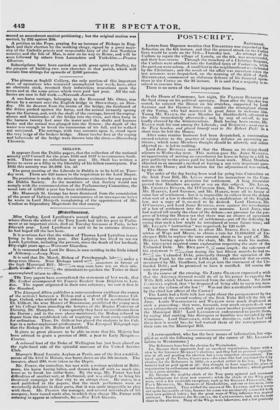In . the House of Commons, last night, Sir FRANCIS EMMETT
put the hiial stamp on his political apostacy. Soon after the Speaker was seated, Ile entered the House on his crutches, supported by Lord SANDON and Sir GEORGE SINCLAIR, amidst the triumphant cheers of tile Tow, who had mustered in great force to welcome him. Young Mr. ELLICE, the new Member for Huddersfield, advanced to the table immediately afterwards ; and, by way of set-off, lie was loudly cheered by the Ministerialists. Both having been sworn, Mr.. ELLICE took his seat RMOIlg the Liberals; and Beene:re—went over to the Tory benches, and placed himself next to Sir Robert Peel/ In short time lie left the House.
After sonic routine business had been despatched, a conversation ensued relative to the practice of raising debates on presenting pe. titions ; which some Members thought should be allowed, and others objected to : it led to nothing.
Lord JOHN RUSSELL moved that the House on its rising should adjourn to Wednesday next. This motion gave Mr. .Tone AxwEr.r. an opportunity of moving an amendment for leave to bring in it bill to give publicity to the prices paid for hand-loom work. Many Members objected to so unusual a method of forcing a not very intro' tunt ques- tion on the House ; and the motion for the adjournment was carried, by 82 to 39.
The order of the day having been read for going into Committee on the Irish Poor Bill, Mr. Lucas moved his instruction to the Corn. mittee to introduce a provision for settlement. A long discussion proved that Members are quite at sea on this subject. Mr. LUCAS, MI. CHARLES BULLER, tile O'CONNOR DON, Mr. POULL:TT SCROrE, Mr. HARVEY, Lord SANDON, arid Mr. HARDY, were all ill favour of some law of settlement : brit it is impossible to collect from the debate what sort of a law it should be—though a modification of the English law, not a copy of it, seemed to be desired. Lord Howler:, Mr. O'CONNELL, and Lord JOHN RUSSELL, were against the introduction of a law of settlement into the present measure. Lord JOHN, who had waited till nearly the close of the debate—we presume for the pur- pose of letting the House see that there was no chance of agreement among the advocates of a law of settlement—put off the difficulty, by saying that such a law might be introduced at some future time; sad Mn'. LUCAS'S " instruction " was negatived, by 120 to 68.
The House then resumed, to allow Mr. SPRING RICE, in a Cora. mittee of Ways and Means, to obtain a vote for 11,000,0001. of Ex. chequer Bills to replace the same amount about to be paid off. Mr. Beasae having again taken the chair, Mr. RICE made his motion. Mr. GOULBURN required some explanation respecting the state of the: Unfunded Debt. Mr. RICE gave his stetement at, some 'length the substance of dee—, • t,;—t.tnit during the last fifteen months he had re. ..„,, tie Unfunded Debt, principally through the operation of the
Sinking Fund, by the sum of 4,994,4504 He admitted that an error, mentioned by Mr. Goulburn, had crept into the statement of the Un- funded Debt; and he promised to have it rectified. Of course the vote was passed.
In the course of the evening, Sir JAMES GRAHAM expressed a. wish • that the Attorney- General would do all in his power to expedite the Wills Bill, which had been received from the other House. Sir JOHN CAMPBELL replied, that "he despaired of being able to carry any mea- sure for the reform of the law ! " Was not this a creditable confession by the chief law officer of tine Crown ?
The Lords had a little talk last night about the postponement by the
Commons of the second reading of the Irish Tithe Bill till the 9th of June. Lords WHARNCLIFFE and \Viet:Low were much displeased at such a proceeding : they were, forsooth, very much surprised—it was most extraordinery conduct, and might cause another postponement of the Municipal Bill ! Lord LANSDOWNE endeavoured to pacify them, by saying that nothing like disrespect or hostility wits sritended by the Commons. Lord limier:nest, with more directness, said be bad told them bow it would be—he had warned them of the consequences of their vote on the Municipal Bill.


























 Previous page
Previous page